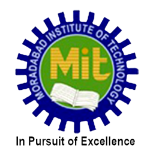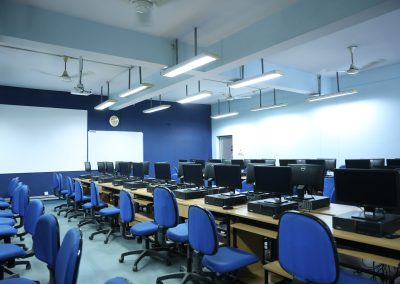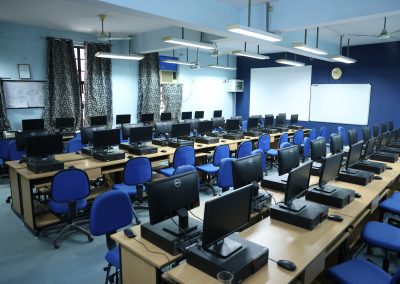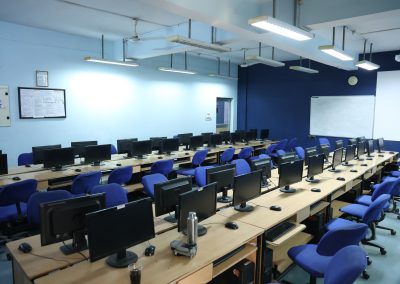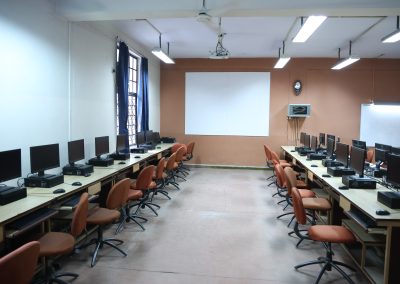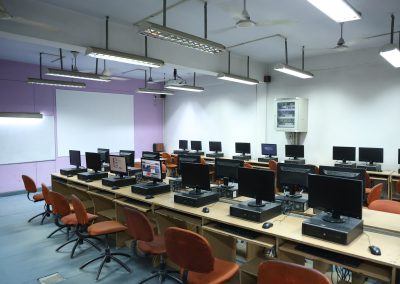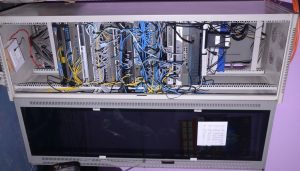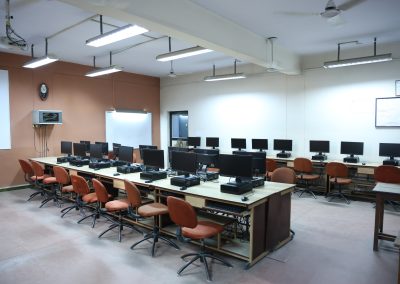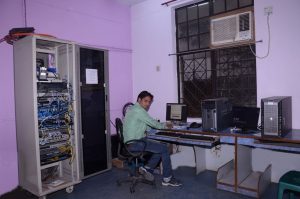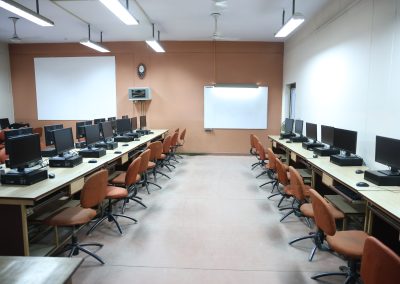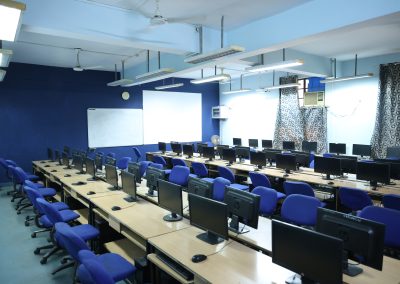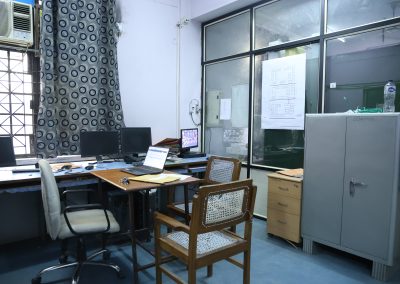
Department of Computer Science & Engineering
Labs
Computer Labs & Server Room
The department has state of art laboratories and computer center having latest computer systems with 24 hour Wi-Fi connectivity facility to give practical exposure to the students and carry out research in areas to computer science & information technology. All the labs are well equipped with necessary application softwares like Visual Studio .Net, Office 2016, Turbo C/C++, Java, PL/SQL,TASM, Linux etc. In all the labs, scanners & printers are also available for the students. The Insttute is also a member of Microsoft’s Campus Agreement. Under this agreement our students and faculty members can access and use latest versions of Microsoft’s operating systems and software for academic use. Following are the major laboratories:
Basic Computer & Languages Lab: Interactive multimedia software tools like Comdex which give the first year students the exposure of basics of Computers and Peripherals in English as well as Hindi language. This Lab is consisting of 25 nodes in all and specifically designed to train first year students.
Data warehousing & Data Mining lab: The objective at the Data warehousing and Mining Laboratory is to construct a research system by discovering knowledge through analyzing hidden patterns of our day-to-day data that comprehensively and seamlessly links several analytic processes and development of fundamental technology and applications for data mining, development of consumer behavior models, and validation of the entire structure through practical testing – with the end goal of applying the system to data mining tasks in the different field. This lab consist of 25 computers and conducted in WEKA Tool.
Python Programming Lab: The objective of Python Programming Lab is to give an introduction to programming and problem solving in Python. It does not require any prior knowledge of programming. Using some examples, the Lab quickly builds up basic concepts such as conditions, loops, functions, lists, strings and tuples. It goes on to cover searching and sorting algorithms, dynamic programming and backtracking, as well as topics such as exception handling and file handling. This lab consist of 25 computers and conducted on Pycharm framework.
Operating Systems Lab: This lab is consisting of 25 computers connected to the server. Students learn the fundamentals of Operating Systems and works on many Operating System including Windows and LINUX and they also prepare case studies.
Software Engineering Lab: The Software Engineering Laboratory is established to assess the measurement and evaluation of the software development process. In this lab a large number of experiments have been designed to give in depth knowledge of software development, deployment and maintenance process. This lab consists of 25 computers and software such as Java and Visual Studio .NET.
DBMS Lab: The students do the work on databases such as Oracle, Access etc. This Lab consists of 25 nodes connected in star topology and various software installed such as D2K, PL/SQL, Windows Server 2008 / 2012.
Graphics Lab and Data structure Lab: The Graphics Lab helps to improve knowledge about presentation of graphical contents in 2D and 3D including implemenattion of sophisticated algorithms used in graphics. In Data structures lab, students learn how to design, implement various data structure. This lab consist of 30 nodes, all netwwork connected in star topology. The lab uses Turbo C ++ , Java , Visual Basic software to develop relevant programs.
Algorithm Lab: The Algorithm lab mainly focuses on the design, Analysis and experimentation of different algorithm related to advance Data structure. This lab helps students to analyse the concepts of advanced design techniques. This lab consist of 25 computers and use Turbo C++ software to simulate the related programs.
Logic Design Lab and Computer Organization Lab: This Lab consists of 25 computers of Windows 7/10 and various software like Winbreadboard, C and TASM. For performing the hardware related experiments various equipments as Digital Trainer Kit, Bread Boards, DVM. 4th semester students learn to control hardware through software using C language. There are dedicated 10 Digital Trainer Kits along with various ICs of NAND, NOR and other gates for practical exposure of digital logics to the students.
Computer Center and Internet Center:
For providing Internet facility to the students, faculty, and staff, Internet services from IDEA (40 Mbps RF Link) and BSNL (40 Mbps OFC link) are deployed. Internet center and computer center are central facilities open to students of all branches beyond Institute hours in late evening to provide the maximum benefits to the students. CS&E department runs and maintains these centers for providing computing and Internet Facility to students and staff of whole campus.
Project Lab: Final year students of Computer Science & Engineering branch perform their final year project work in this lab under the guidance of their respective project guides. The scope of the project includes the concepts, methodologies, techniques etc. in the area of computer science, information technology and may overlap with concepts in areas such as mathematics, logic, and software engineering as well. The project lab consists of 40 nodes in all and provides many platforms/softwares such as Visual Studio, Oracle 8i, Developer 2000, Network Simulators, MATLAB, .NET, Office 2013, Turbo C/C++. Adobe Page Maker, Java kit, PL/SQL, TASM, Corel Draw, Red-hat Linux 7.1. Students are encourged to work for their dream projects even beyond college hours.
Some of the good Projects done by our students are as follows:
S.No. | Project Name |
| 1. | Translaze- An Application that convert any signboard into English |
| 2. | Heart Disease Detection |
| 3. | Development of an Android Application for Recognizing Handwritten Text on Mobile Devices |
| 4. | Computer Aided Diagnosis System for Segmentation of Brain Tumor |
| 5. | The Lightning Man Alive: 3D Game |
| 6. | Smart Agriculture System based on the concept of IoT |
| 7. | Phishing Detection using Machine Learning |
| 8. | Diabetic Retinopathy detection from Retinal images |
| 9. | Municipal Grievance and Redress Application under smart city project |
| 10. | Smart cane for Blinds |
| 11. | Stock Market Analysis |
| 12. | Clean City With Smart Dustbins |
| 13. | YouTube Monetization |
| 14. | AnyBody Can Do Database Management |
| 15. | IOT based Digital Door Locking System |
| 16. | Advance Home Automation Using Bluemix |
